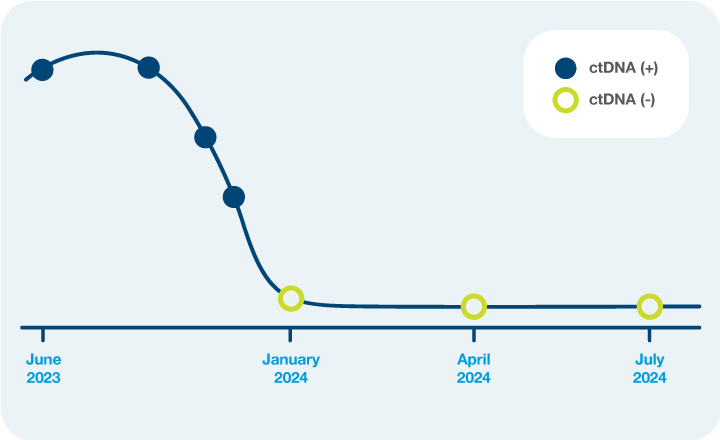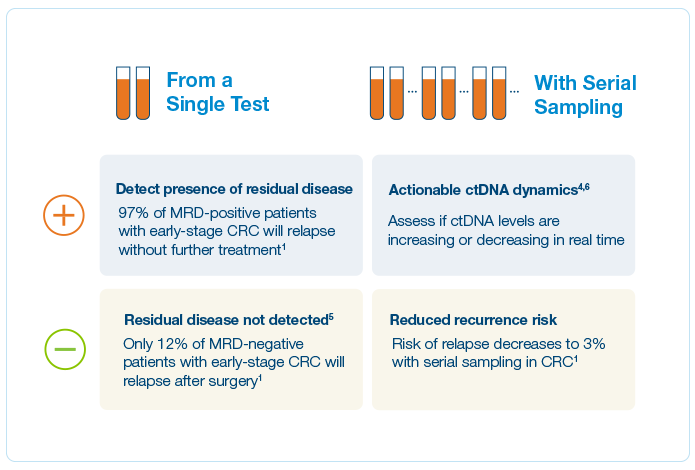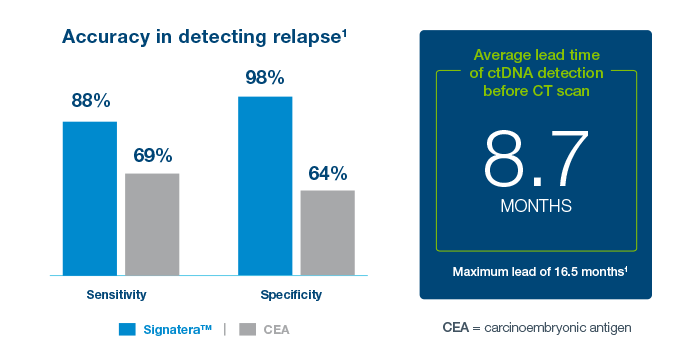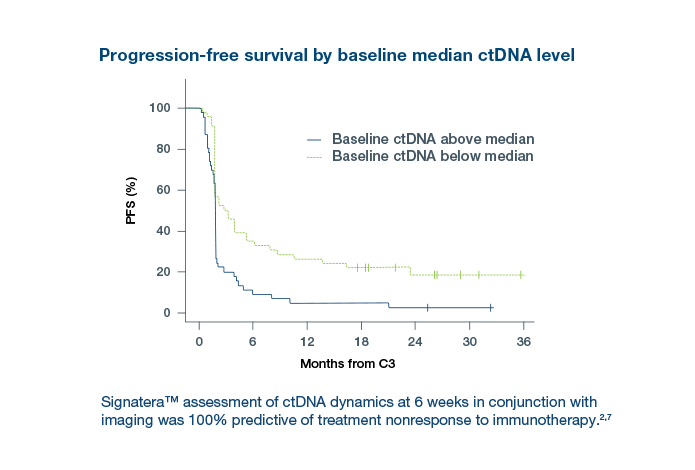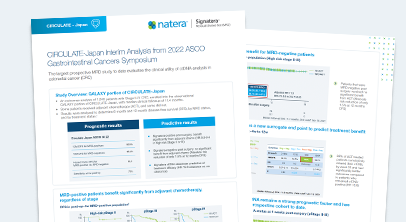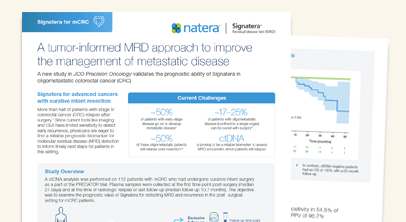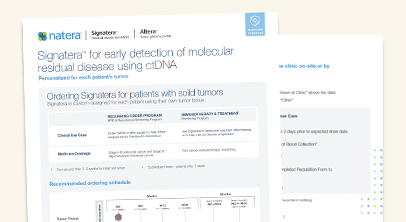Inform Clinical Challenges in Colorectal Cancer
Identify High Risk Patients
80%
Of CRC patients are cured by surgery alone — knowing which patients would benefit from ACT is often unclear1
Predict Overall Survival
36-month OS
96%
in ctDNA negative patients vs. 71.8% in ctDNA positive patients2
ctDNA clearance and survival
100%
MRD-positive patients who achieved sustained clearance had 100% OS at 24 months2
Get Started
Clinical Application: What’s the value of serial testing in the surveillance setting?
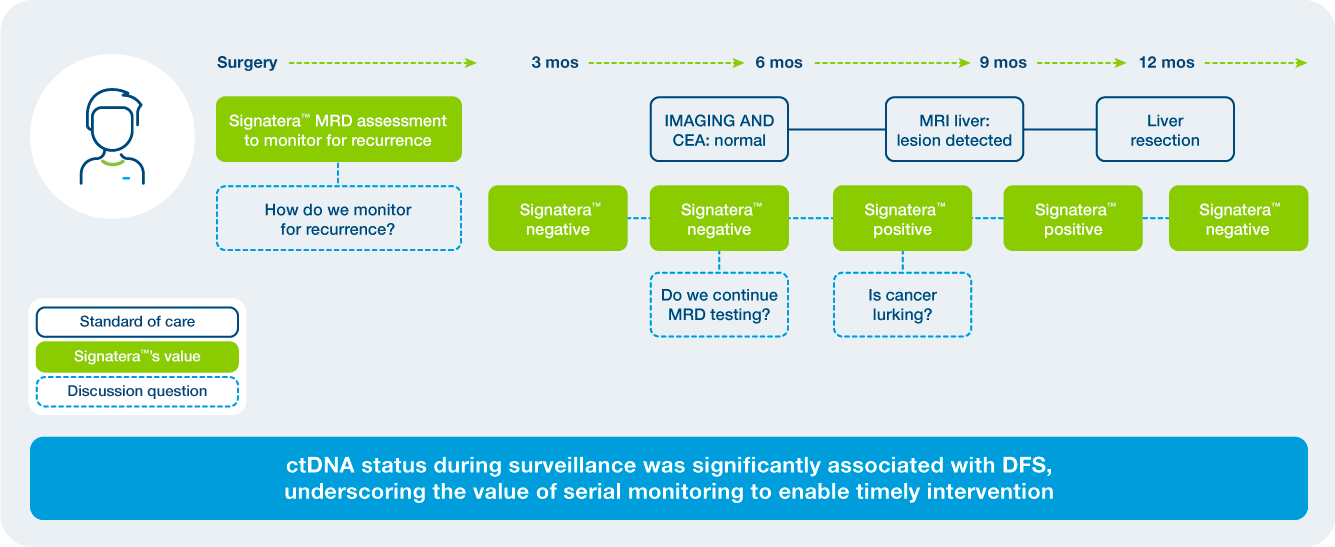
Predict which CRC patients may benefit from treatment escalation
The CALGB readout from ASCO GI analyzes >1,000 patients with stage III colorectal cancer randomized to receive FOLFOX (+/-) celecoxib:
- Signatera™-positive patients treated with both chemotherapy and celecoxib showed a 40% improvement in overall survival compared to chemotherapy alone11.
- No benefit from celecoxib was observed in Signatera™-negative patients.
- Patients who were Signatera™-positive after surgery were 7x more likely to recur and >6x more likely to have decreased OS than patients who were Signatera™ -negative.
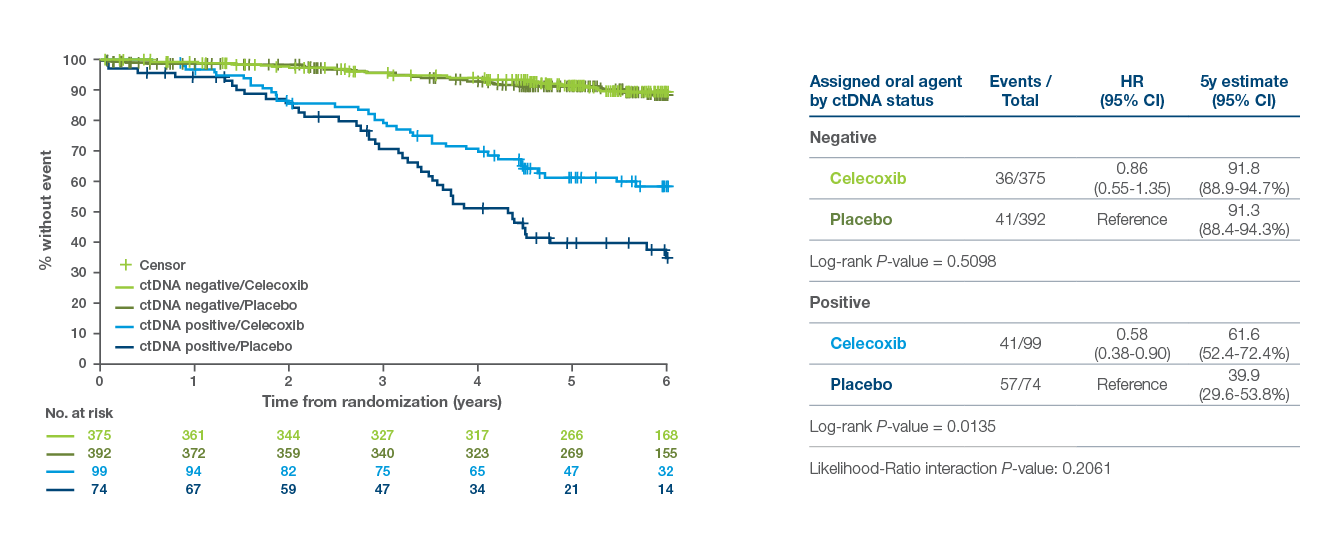
Natera Oncology can help support this therapy recommendation:
- Altera™ tumor genomic profiling for patient selection + Signatera™ MRD testing
- Altera™ detects PI3K pathway mutations (PIK3CA, PTEN, PIK3R1), which guide NSAID therapy decisions
With a single sample, you can get molecular residual disease (MRD) and tumor genomic profiling from the same tumor sample, enabling you to select the right patients for additional therapy and track their MRD status over time.
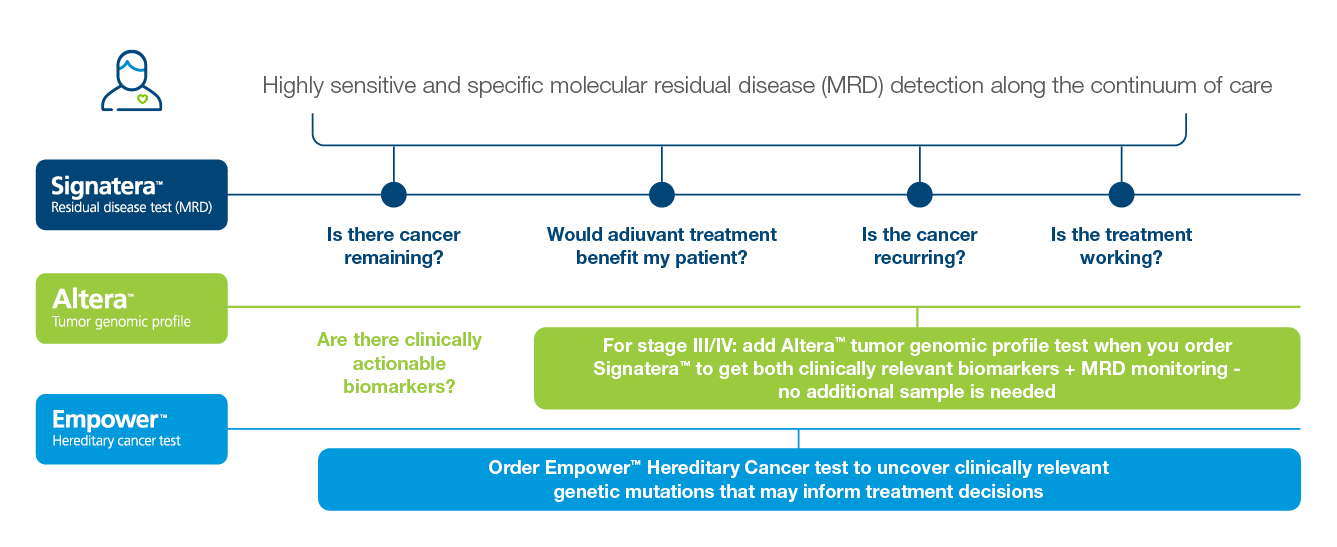
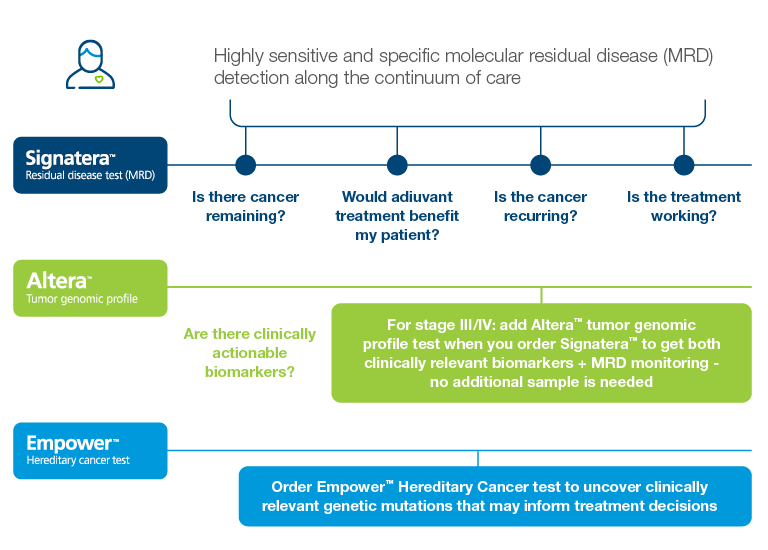
Signatera™ status post-operatively is highly prognostic of disease recurrence
The latest GALAXY findings from the CIRCULATE-Japan trial analyzed >2,240 patients with stage II– IV colorectal cancer including 36M-DFS and 24M- OS data, demonstrating the importance of post-surgical ctDNA analysis and its association with long term survival:
- Signatera™ MRD status predicted overall survival: Patients who tested Signatera™-positive after surgery had significantly worse overall survival (OS) compared to those who were Signatera™-negative.
- Signatera™ MRD status identified adjuvant chemotherapy benefit: High-risk stage II and stage III–IV patients who were Signatera™-positive post-surgery and received ACT showed improved OS.
- Signatera™ positivity was shown to be the strongest predictor of recurrence: Post-operative Signatera™ positivity was the most significant prognostic factor associated with decreased disease-free survival (DFS).
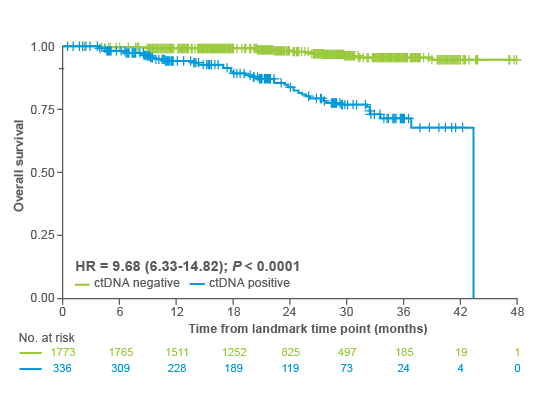
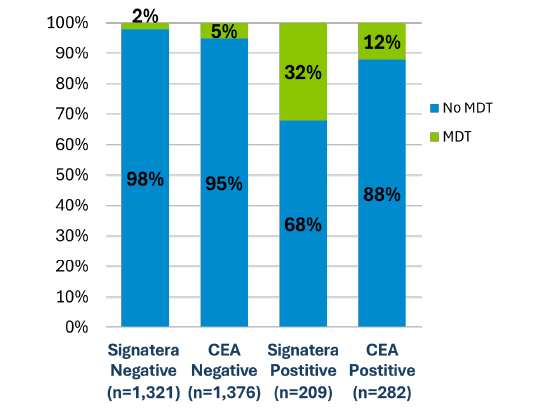
Identify which patients will benefit from increased surveillance
- Signatera™ identified more patients eligible for curative-intent MDT during surveillance by detecting recurrence at the molecular level, when patients are still candidates for local therapy
- Signatera™-positive patients had a 35x higher risk of recurrence: Signatera™ detected relapse 6 months before recurrence and showed a 78% lower recurrence risk with ACT in high-risk stage II/III CRC.
- Signatera™-positive patients – up to 20x more likely to receive MDT compared to Signatera™-negative patients, outperforming CEA
Powering Personalized Decisions in Early and Late Stage CRC

Discover the Colorectal Cancer Data
- Signatera™ MRD testing in colorectal cancer is validated across treatment settings.
-
Neoadjuvant Response Monitoring
- Monitor neoadjuvant response with serial Signatera™ testing.
- Identify low risk patients who are ctDNA-negative to potentially support a nonsurgical “watch and wait” approach.
-
Post-Surgical MRD Assessment
-
Recurrence Monitoring
-
ctDNA clearance
Enabling time to process and make informed plans
“Signatera fired the warning shot that something was not right. Together with my HCP we had the opportunity to take the time to consider the options. She put the choice on me on what to do with a positive test result and it enabled me to choose to take a more aggressive approach.”
Keith, CRC patient
Covered by Medicare for multiple solid tumor indications
Learn More About Signatera™ in Colorectal Cancer
Ready to try Signatera™ for your colorectal cancer patients?
References
1Reinert T, et al. Analysis of plasma cell-free DNA by ultradeep sequencing in patients with stages I to III colorectal cancer. JAMA Oncol. 2019;5(8):1124-113. https://doi.org/10.1001/jamaoncol.2019.0528
2Kotani D. et al., Molecular residual disease and efficacy of adjuvant chemotherapy in patients with colorectal cancer, Nature Medicine v29 Issue 1 Jan 2023
3Kotani D. et al., Molecular residual disease and efficacy of adjuvant chemotherapy in patients with colorectal cancer, Nature Medicine v29 Issue 1 Jan 2023
4Bratman SV, et al. Personalized circulating tumor DNA analysis as a predictive biomarker in solid tumor patients treated with pembrolizumab. Nat Cancer. 2020;1(9):873-881. https://doi.org/10.1038/s43018-020-0096-5
5Loupakis F, et al. Detection of molecular residual disease using personalized circulating tumor DNA assay in patients with colorectal cancer undergoing resection of metastases. JCO Precis. Oncol. 2021(5):1166-1177. https://doi.org/10.1200/PO.21.00101
6Abbosh C, et al. Phylogenetic ctDNA analysis depicts early-stage lung cancer evolution. Nature. 2017;545(7655):446-451. https://doi.org/10.1038/nature22364
7Sinicrope FA, et al. DNA mismatch repair status and colon cancer recurrence and survival in clinical trials of 5-fluorouracil-based adjuvant therapy. J Natl Cancer Inst. 2011;103(11):863–875. https://doi.org/10.1093/jnci/djr153
8Aoyama T, et al. Impact of postoperative complications on the colorectal cancer survival and recurrence: analyses of pooled individual patients' data from three large phase III randomized trials. Cancer Med. 2017;6(7):1573–1580. https://doi.org/10.1002/cam4.1126
9Yothers G, et al. Validation of the 12-gene colon cancer recurrence score in NSABP C-07 as a predictor of recurrence in patients with stage II and III colon cancer treated with fluorouracil and leucovorin (FU/LV) and FU/LV plus oxaliplatin. J Clin Oncol. 2013;31(36):4512-4519. https://doi.org/10.1200/JCO.2012.47.3116
10Corcoran RB, et al. Applications of cell-free DNA analysis to cancer treatment. N Engl J Med. 2018;379(18):1754-1765. https://doi.org/10.1056/NEJMra1706174
11Nowak JA et al. Prognostic and predictive role of ctDNA in stage III colon cancer treated with celecoxib: Findings from CALGB/SWOG 80702. Presented at ASCO GI 2025.
